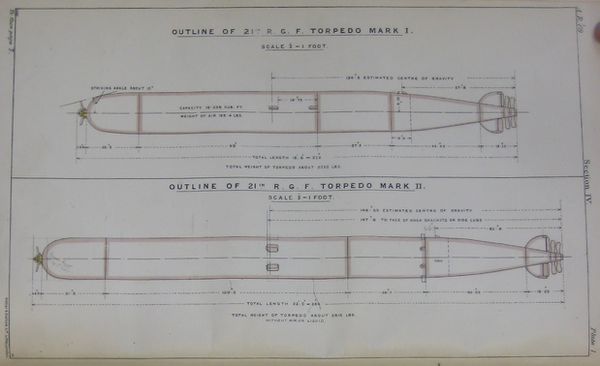21-in Mark II Torpedo (UK): Difference between revisions
| Line 18: | Line 18: | ||
==Mark II*== | ==Mark II*== | ||
Introduced in 1914, these featured rectified threads throughout, air vessel pressures of 2,350 psi for 10,750 yard range and two other improvements.{{ARTS1914|p. 9}} | Introduced in 1914, these featured rectified threads throughout, air vessel pressures of 2,350 psi for 10,750 yard range and two other improvements.{{ARTS1914|p. 9}} | ||
In May, 1918, the torpedo and its Mark II ancestor were noted as having the following settings at a charge of 2350 pounds per square inch, though each torpedo would have either the 35 or 44.5 knot setting, but not both:{{GFGTO|p. 16}} | |||
* 44.5 knots to 4200 yards (High Speed) | |||
* 35 knots to 6000 yards (High Speed) | |||
* 23 knots to 14,000 yards (Medium Speed) | |||
* 18 knots to 17,000 yards (E.R.) | |||
The 2350 psi pressure was the "action" pressure; normal was 2200. Ranges were 300 yards less at 44.5 knots and 1,000 yards less at lower speeds at the normal pressure. | |||
==Mark II**== | ==Mark II**== | ||
Revision as of 15:31, 2 May 2013

The 21-in R.G.F. Mark II Torpedo was a British torpedo developed at the Royal Gun Factory and first ordered for service in 1909-1910.[Citation needed]
Development and History
It was developed in parallel with the Mark I torpedo, which was shorter at 18.5 feet.
Mark II
In 1909-1910, 4 hook bracket torpedoes were ordered.[Citation needed]
In May, 1918, the torpedo and its Mark II* variant were noted as having the following settings at a charge of 2350 pounds per square inch, though each torpedo would have either the 35 or 44.5 knot setting, but not both:[2]
- 44.5 knots to 4200 yards (High Speed)
- 35 knots to 6000 yards (High Speed)
- 23 knots to 14,000 yards (Medium Speed)
- 18 knots to 17,000 yards (E.R.)
The 2350 psi pressure was the "action" pressure; normal was 2200. Ranges were 300 yards less at 44.5 knots and 1,000 yards less at lower speeds at the normal pressure.
Mark II*
Introduced in 1914, these featured rectified threads throughout, air vessel pressures of 2,350 psi for 10,750 yard range and two other improvements.[3]
In May, 1918, the torpedo and its Mark II ancestor were noted as having the following settings at a charge of 2350 pounds per square inch, though each torpedo would have either the 35 or 44.5 knot setting, but not both:[4]
- 44.5 knots to 4200 yards (High Speed)
- 35 knots to 6000 yards (High Speed)
- 23 knots to 14,000 yards (Medium Speed)
- 18 knots to 17,000 yards (E.R.)
The 2350 psi pressure was the "action" pressure; normal was 2200. Ranges were 300 yards less at 44.5 knots and 1,000 yards less at lower speeds at the normal pressure.
Mark II**
Introduced in 1914, these included the improvements of the II** and added three other small features.[5]
Mark II***
Mark II***
In 1915, Commander-in-Chief Home Fleet wanted a proportion of torpedoes able to reach the greatest possible range. By year's end, trials of a torpedo with a projected range of 18,000 yards at 19-20 knots were anticipated.[6]
Footnotes
- ↑ Annual Report of the Torpedo School, 1909. Plate 1.
- ↑ Grand Fleet Gunnery and Torpedo Orders. p. 16.
- ↑ Annual Report of the Torpedo School, 1914. p. 9.
- ↑ Grand Fleet Gunnery and Torpedo Orders. p. 16.
- ↑ Annual Report of the Torpedo School, 1914. p. 9.
- ↑ Annual Report of the Torpedo School, 1915. p. 37.
Bibliography